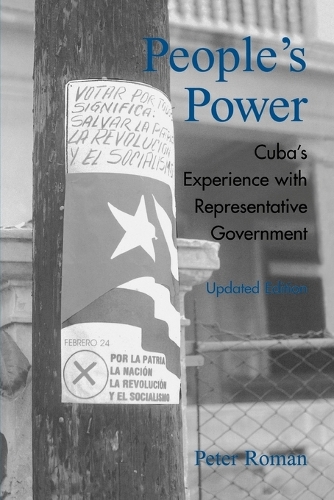
People's Power: Cuba's Experience with Representative Government
(Paperback)
Publishing Details
People's Power: Cuba's Experience with Representative Government
By (Author) Peter Roman
Bloomsbury Publishing PLC
Rowman & Littlefield Publishers
11th November 2003
United States
Classifications
General
Non Fiction
Regional / International studies
321.8097291
Physical Properties
Paperback
312
Width 150mm, Height 229mm, Spine 20mm
485g
Description
A theoretical, historical, and contemporary analysis. The book encompasses the institution of the Organs of the People's power in 1976 to the present.
Reviews
Praise for the first edition: This is the first study to demarcate an important organ of Cuba's socialist government from its Soviet model. The study results in a reassessment of some entrenched presumptions about Cuba-that its government is totalitarianand non-responsive, and that all its allegedly representative bodies are rubber stamps, totally dominated by the Communist Party.... * The Washington Report On The Hemisphere *
Praise for the first edition: [Poeple's Power] reminds readers of a largely forgotten alternative approach to democracy, a (not fully worked out) approach that was embraced by many socialists for over a century but later was largely forgotten following the rejection of its completely bastardized application in the USSR. In this way this work also constitutes a contribution to the current debate on the nature of democracy under socialism, arguably the central issue in the post USSR debate on the nature of socialism... * Science & Society *
Praise for the first edition: This is a powerful, well-written, well-argued, and honest book. It makes a really eye-opening classroom text for courses on Cuba or socialism. Peter Roman should be congratulated upon a singular accomplishment..... * Monthly Review *
Peter Roman's book is a valuable study that helps us better understand the workings, successes, and shortcomings of the Cuban government's effort to promote democracy in that country. -- City University of New York, Carlos Sanabria, City University of New York
This well-researched and -written book . . . will come as a revelation to many readers. People's Power, based on years of field work and first-hand experience of Cuban elections and the workings of representative bodies, demonstrates that there is a functioning popular democratic political culture as the basis of the Cuban government. * Political Affairs *
Praise for the first edition:
This is the first study to demarcate an important organ of Cuba's socialist government from its Soviet model. The study results in a reassessment of some entrenched presumptions about Cuba-that its government is totalitarian and non-responsive, and that all its allegedly representative bodies are rubber stamps, totally dominated by the Communist Party.
Praise for the first edition: [Poeple's Power] reminds readers of a largely forgotten alternative approach to democracy, a (not fully worked out) approach that was embraced by many socialists for over a century but later was largely forgotten following the rejection of its completely bastardized application in the USSR. In this way this work also constitutes a contribution to the current debate on the nature of democracy under socialism, arguably the central issue in the post USSR debate on the nature of socialism. * Science & Society *
Praise for the first edition:
This is a powerful, well-written, well-argued, and honest book. It makes a really eye-opening classroom text for courses on Cuba or socialism. Peter Roman should be congratulated upon a singular accomplishment.
Deserves a place on the shelves of all serious students of Cuba and of comparative government. * The Bulletin Of Latin American Research *
Praise for the first edition:
This detailed study of the representative institutions of Cuban government provides considerable insight as to the sources of the resilience of Cuban socialism in the face of its well-known economic challenges. . . . Roman makes a strong case that local participation by ordinary citizens is common, lively, and given the lack of resources, reasonably effective. . . . Cuba's system should definitely be pondered by serious students of democracy, and Roman's informative book is a good place to start.
Author Bio
Peter Roman is professor of political science at The Graduate Center, The City University of New York.
